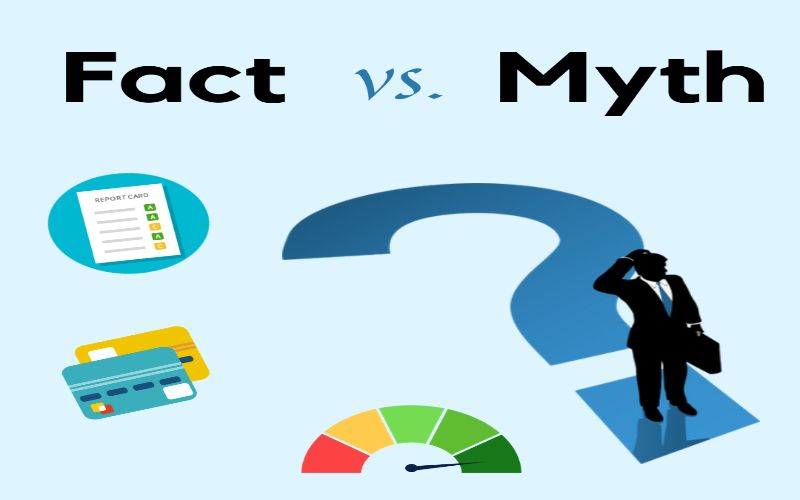There are a lot of myths surrounding credit cards that restrict people from getting one. The thought of being in the debt trap often plagues them. It is a great financial tool that can help you manage your short-term expenses without taking a loan. It has many benefits if you know how to use it prudently. If you are using it to finance unnecessary purchases, it might lead to financial difficulties in the future. Timely repayment of your bills will give a boost to your score and help you earn credit card reward points. This will help you avail better loan products. Read on to know more about some common credit card myths and facts.
Myths associated with credit card usage
Most credit card myths are propagated by people who don’t even own a card. They just believe whatever they have heard from different people. It is highly recommended that you always conduct your research about things rather than blindly believing what people have to say. Here are some most common myths associated with credit cards.
-
Holding multiple cards will hamper your credit score
One of the most common myths that deter people to get a new credit card is this. Most customers believe that holding multiple cards will negatively influence their credit score. Contrary to this popular belief, holding over one credit card doesn’t negatively influence your credit score in the medium to long run. Applying for a new card requires a hard-line credit inquiry and this can reduce your score to an extent, but holding multiple credit cards doesn’t impact your score. If you use it wisely, you can divide your credit expenses and reduce the credit utilization ratio for each card. A high credit utilization ratio will surely hamper your credit score.
-
It is enough to pay the minimum due amount each month
New users often think that it is enough to pay the minimum due amount each month. This is a common myth that is far from the truth. Paying the minimum due amount will only save you from a late payment penalty. However, you will be charged an interest fee for the remaining balance for that cycle. We must know that the credit card interest rate is higher than other loans. So, it is recommended that you pay the full amount as soon as possible. It will also help you earn credit card reward points.
-
An increase in credit card limit will draw more debt
It is certainly good to have a high credit card limit to manage emergency expenses. However, there is a common myth among many credit card users that a high credit limit will invite more debt. This is not true at all. A high credit limit gives you more flexibility to manage your expenses. If you start spending the amount carelessly, it will lead to more debt. However, if you practice fiscal prudence, you will find a higher credit limit very helpful.
-
Paying credit card dues late is okay as long as the full amount is paid
Most people believe that paying their credit card debt in full, even at a later date, is okay. This is not true at all. Most credit card companies have a flexible grace period that allows users to pay their outstanding balance without charging any interest. If you fail to pay the amount in this duration, you will have to bear additional interest and late payment charges.
-
Spending more will improve your credit score
Spending a higher amount from your credit card limit will not improve your credit score. This is a common myth, especially among new users. Banks and other financial institutions use a credit utilization ratio to assess your creditworthiness. A very high credit utilization ratio can hamper your credit score. Keeping a low utilization ratio adds positively to your creditworthiness. A credit utilization ratio between 20% to 30% is ideal.
-
Checking your credit score will reduce the same
This is one of the biggest credit card myths that are commonplace even amongst old users. It is important to understand the difference between a normal credit score check and a hard-line credit score inquiry. An application for a new line of credit requires a hard-line inquiry which might reduce your credit score, but a soft inquiry doesn’t do any damage to your credit score. Contrary to this belief, it is good to monitor your credit score regularly. You should check your score every month to know if it has increased or decreased. This will also allow you to take corrective action to maintain a healthy credit score.
-
Canceling your credit card will improve your credit score
This is also a common myth that existing users believe in. People who fail to repay their credit card bills on time often believe that canceling their card will improve their credit score which has been damaged by a poor repayment history. This is not true at all. If you want to improve your credit score, you should use your card as a tool for improvement.

